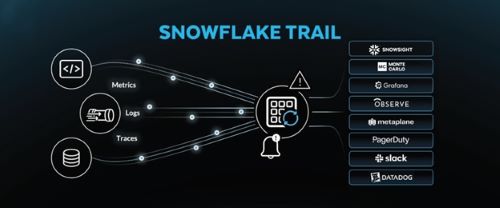Snowflake Doubles Down on Developers with End-to-End Capabilities for Building Enterprise-Grade Pipelines

Snowflake (NYSE: SNOW), the AI Data Cloud company, today announced at its annual user conference, Snowflake Summit 2024, new tools and innovations that accelerate how developers build enterprise-grade pipelines, models, and applications with their data. Snowflake is furthering its mission of eliminating complexity for customers with new developer tooling and native integrations that speed up development, while empowering them to efficiently ship more advanced products in the AI Data Cloud.
“Thousands of developers around the globe already rely on Snowflake as their go-to development platform. Our latest innovations continue to push the boundaries of what builders can create in the AI Data Cloud, bringing familiar, yet powerful experiences to their enterprise data where it already lives,” said Jeff Hollan, Head of Applications and Developer Platform, Snowflake. “Developers can harness the full breadth of Snowflake’s leading scale, performance, and governance to easily deliver large language model-powered applications that unlock value, ultimately putting AI in the hands of more users.”
Harness Snowflake’s Speed and Simplicity to Advance AI Development
Developers are regularly looking for ways to shorten the time from prototype to deployment, with Snowflake quickly becoming the platform for builders to create powerful data products. By harnessing the combination of Dynamic Tables and Snowpipe Streaming, users can unlock low-latency transformation pipelines to fuel AI and machine learning (ML) model development, all within the AI Data Cloud. Over 2,900 customers today are already running more than 200,000 Dynamic Tables1 to build and manage production-grade data pipelines, and that number continues to grow.
Snowflake is now arming developers with even more ways to accelerate their AI development directly on their data in the AI Data Cloud with Snowflake Notebooks (now public preview) natively integrated with the full breadth of the Snowflake platform including Snowpark ML, Streamlit, and Snowflake Cortex AI. Snowflake Notebooks provides a single, easy-to-use development interface for Python, SQL, and Markdown. Developers can also leverage Snowflake Notebooks to experiment and iterate on their ML pipelines, harness AI-powered editing features, simplify data engineering workflows, and more to unlock increased productivity and collaborative development.
“With Snowflake Notebooks, we can easily integrate our experiment tracking with Weights & Biases directly within notebooks,” said Lukas Biewald, Co-founder and CEO, Weights & Biases. “Centralized, secure access to Snowflake data and compute lets you run data engineering and analysis alongside ML modeling in a notebook-style format that’s familiar, intuitive, and powerful. We’re excited to see how our customers use it to run experiments faster.”
Snowflake is also adding a Snowpark pandas API (now public preview), enabling Python developers to work with the same pandas syntax they know and love for even more advanced AI and pipeline development, while benefiting from Snowflake’s performance, scale, and governance for execution.
Unlock Declarative Development with New DevOps and Observability Capabilities
Snowflake is further delivering developer simplicity with a truly data-centric approach to DevOps, seamlessly integrating development, operations, and data management within a single platform. By defining the desired state of their data pipelines with infrastructure-as-code principles, rather than scripting complex workflows line by line, Snowflake is prioritizing a declarative approach to development with the new Database Change Management (now public preview) feature. In addition, data engineers and developers can now use Snowflake’s new Git integration (now public preview) to enhance development collaboration across teams and streamline deployments across different environments, leverage Snowflake’s Python API (generally available soon) to efficiently manage resources, use the open source Snowflake CLI (generally available soon) as a single interface to manage CI/CD pipelines, and more.
Snowflake is also unveiling Snowflake Trail, a rich set of observability capabilities that provide enhanced visibility into data quality, pipelines, and applications, empowering developers to monitor, troubleshoot, and optimize their workflows with ease. Snowflake is providing built-in telemetry signals for Snowpark and Snowpark Container Services, enabling users to easily diagnose and debug errors using metrics, logs, and distributed tracing — without having to manually set up agents or transfer data. Additionally, Snowflake Trail is built with OpenTelemetry standards so developers can integrate with popular observability and alert platforms including Datadog, Grafana, Metaplane, PagerDuty, Slack, and more, in addition to working natively in Snowsight. Snowflake also partners with observability platforms such as Monte Carlo and Observe to provide end-to-end observability to customers.
Productize AI-Powered Apps, And Build Your Business Faster in the AI Data Cloud
According to a recent IDC survey2, AI Applications is currently the largest category of AI software, accounting for roughly one half of the market’s overall revenue in 2023. To help businesses further build and deliver these sophisticated applications, Snowflake is announcing the Snowflake Native App Framework integration with Snowpark Container Services (now public preview on AWS). The integration enables organizations to extend the breadth and variety of applications they build in the AI Data Cloud using configurable GPU and CPU instances to fit a range of use cases spanning computer vision automation, geospatial data analysis, ML applications for enterprises, and more.
Application developers can build their AI-powered Snowflake Native Apps once, and then deploy and distribute them across clouds and regions to thousands of Snowflake customers through Snowflake Marketplace, with over 160 total Snowflake Native Apps3 already available today. Many of the world’s largest organizations rely on Snowflake Marketplace as their distribution platform for unlocking entirely new revenue streams, distributing their Snowflake Native Apps, and accelerating monetization and procurement of those apps. In addition, hundreds of startups are choosing to build their entire businesses on Snowflake, with a handful of providers including Maxa, My Data Outlet, and RelationalAI earning millions from their apps by distributing them on Snowflake Marketplace.
“Since releasing our Snowflake Native App built with Snowpark Container Services, we have seen a fivefold increase in customer interest and our sales process has become much more streamlined,” says Molham Aref, Founder and CEO of RelationalAI. “What used to take several months with architecture, security, and procurement reviews, now takes mere days, and the ability to monetize our Snowflake Native App on Snowflake’s platform through the Marketplace Capacity Drawdown program will further accelerate our customer engagements. Our partnership with Snowflake is providing incredible customer value and enables organizations like Cash App to gain important insights from their data in ways that were not possible before.”
Continued Innovation at Snowflake Summit 2024
Snowflake also announced new advancements to Snowflake Cortex AI and Snowflake ML that unlock the next wave of enterprise AI for customers; new innovations to its single, unified platform that provide thousands of organizations with increased flexibility and interoperability across their data; a new collaboration with NVIDIA that customers and partners can harness to build customized AI data applications in Snowflake; the Polaris Catalog, a vendor-neutral, fully open catalog implementation for Apache Iceberg; and more at Snowflake Summit 2024.
Snowflake has achieved the Dubai Electronic Security Centre (DESC) certification in the UAE and covers the company’s operations in the Azure UAE North region
Forward Looking Statements
This press release contains express and implied forward-looking statements, including statements regarding (i) Snowflake’s business strategy, (ii) Snowflake’s products, services, and technology offerings, including those that are under development or not generally available, (iii) market growth, trends, and competitive considerations, and (iv) the integration, interoperability, and availability of Snowflake’s products with and on third-party platforms. These forward-looking statements are subject to a number of risks, uncertainties and assumptions, including those described under the heading “Risk Factors” and elsewhere in the Quarterly Reports on Form 10-Q and the Annual Reports on Form 10-K that Snowflake files with the Securities and Exchange Commission. In light of these risks, uncertainties, and assumptions, actual results could differ materially and adversely from those anticipated or implied in the forward-looking statements. As a result, you should not rely on any forward-looking statements as predictions of future events.
© 2024 Snowflake Inc. All rights reserved. Snowflake, the Snowflake logo, and all other Snowflake product, feature and service names mentioned herein are registered trademarks or trademarks of Snowflake Inc. in the United States and other countries. All other brand names or logos mentioned or used herein are for identification purposes only and may be the trademarks of their respective holder(s). Snowflake may not be associated with, or be sponsored or endorsed by, any such holder(s).
Last Updated on 6 months by News Desk 2













